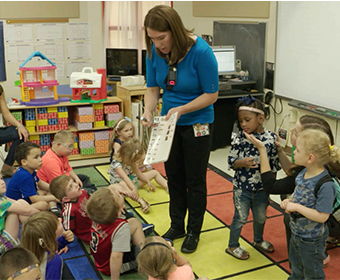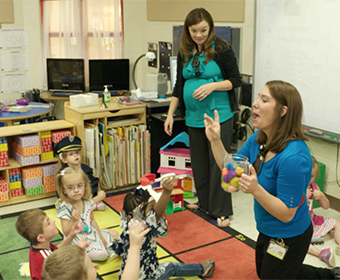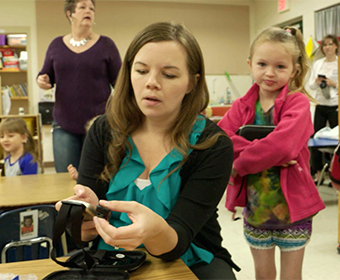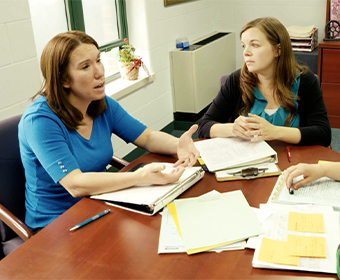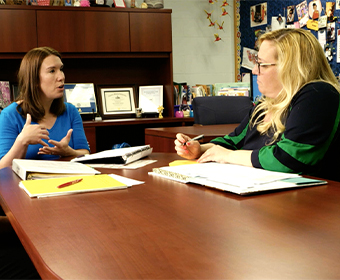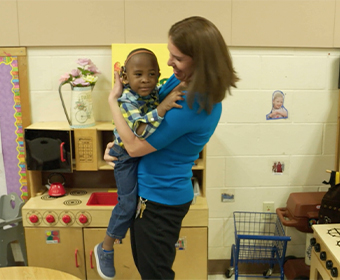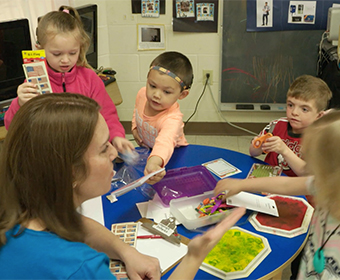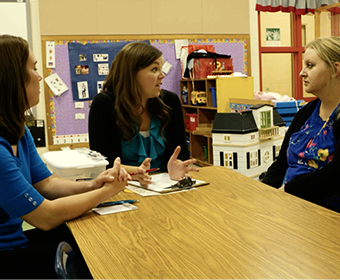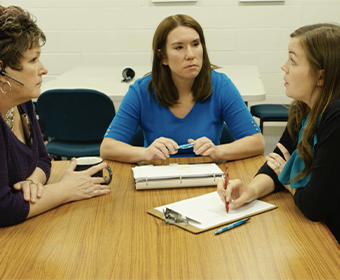School:
Valeska Hinton Early Childhood Education Center
Position:
Teacher of the Deaf
Number of Years Teaching:
5
Different Grades that you have taught:
I was an itinerant teacher of the deaf and hard of hearing for 3 years before coming to Pre-K. Itinerant teachers travel to schools and provide support and direct services to children with hearing loss and their home schools for students ages 3-21.
How did you know that you wanted to teach early learners:
I have always enjoyed the puzzle of helping others understand things. I remember even from a young age thinking about the best way to explain things so others understood. I also had experiences as a young child with a friend down the street who was deaf and eventually friends in high school with hearing loss. When I began to pursue observations in special education classrooms, I discovered deaf and hard of hearing education. I went on to earn a degree in this field and am thankful for “stumbling” upon a career I love. As an itinerant teacher, I often worked with students who were struggling in late elementary or middle school in part due to missed opportunity in their early years. I was troubled by students who on paper looked similar to peers with hearing loss but functioned so differently. I continued to learn and continued course work that helped me discover the impact early years of development have on a child’s learning trajectory. Specifically, for deaf and hard of hearing children, it is well known that the early years are critical for listening and language development. I strongly desire for children with hearing loss to meet their full potential and that their hearing loss be a part of who they are but not define them or limit their opportunities. Knowing the impact that early years have, I have no desire to be anywhere else than with young learners!
What are a few “non-negotiables” of your early learning classroom (kinda your educational philosophy)?:
Similar to what brought me to early childhood, I believe the presence of a hearing loss or another disability should not be a defining factor for what a child is able to become or achieve in their lives. During their time spent in the classroom, my students need to feel loved and cared for and develop the skills to move towards independence and success in the years to come. A foundation needs to be built both in their language development and academic skills but also in their social-emotional skills to be able to understand and regulate their feelings and emotions and have successful interactions and relationships with their families and peers. I desire for my students to feel safe to take risks and try hard things, to be challenged and pushed to meet their potential, yet nurtured and loved where they are in their learning.
What is something that you want us to know about you as a teacher of young children?:
I recognize that the profession of teaching requires more learning than teaching. Though your skills and tools will grow, there will always be room to improve and better meet the needs of students. I have continued my education formally and informally each year since earning my bachelor's degree and am determined to remain a learner throughout my career. I believe that the field of education must continue to grow and evolve. Though we do the best we can with what we know, as we research and learn about how children learn and develop, we too must change and grow to help all children reach their potential.
Anything else you would like your viewers to know?:
I enjoy the challenge of teaching young children and teaching children with various learning needs. I am specifically drawn to the supporting and teaching deaf and hard of hearing children as their learning needs are unique, but their potential is great! The deaf and hard of hearing population of students makes up just 1% of the population of students receiving services through special education and as a result, their research supported learning needs are not widely understood. Teachers of the deaf and hard of hearing have training specific to the needs of this population and are essential for supporting the development of children with all levels of hearing loss in a variety of educational settings.


